Create your own GitOps controller with Rust
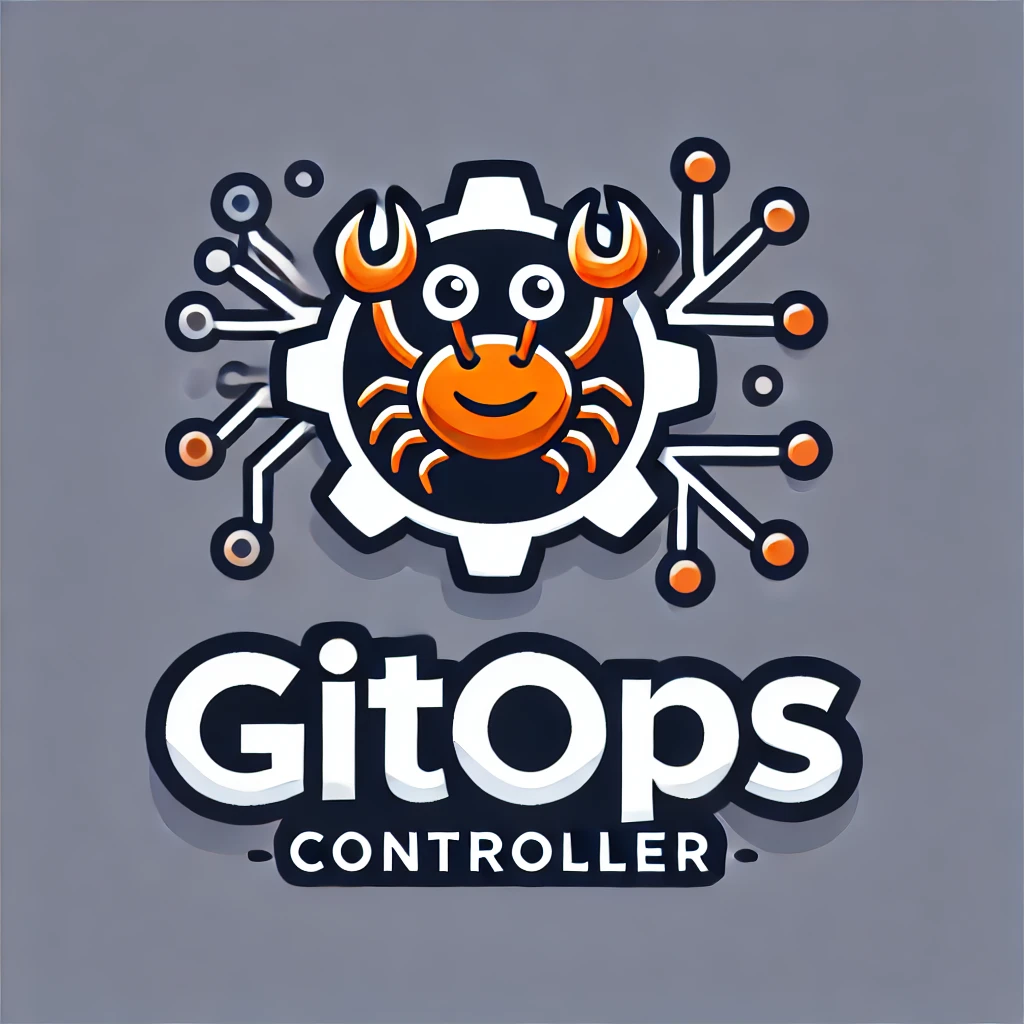
Introduction
In this article we will see how to use Kube and Kind to create a local test cluster and a controller using git2 (libgit2), then deploy that controller in the cluster and test it, the repository with the files can be found here, and also the manifests.
High level overview
The controller simply automates updating our Kubernetes manifest (specifically a deployment manifest) based in some annotations.
- Fetch app and manifest repos.
- Update the manifest repo with the latest SHA from the App repo
- Push the changes
- Let ArgoCD handle applying the change.
As you might imagine there are a lot of moving parts here, and different options, this is the “Pull” approach to gitops, if you want to learn more about that you can go here.
On another topic you might be wondering what problem are we trying to solve here? Usually when you are making changes to your application you need to also have a process to update your manifests so the newest version is released, depending on the approach that you or your team prefers it can be push or pull, in this case we will explore what it means for it to be a pull method and also how to run it in Kubernetes as a controller (since it will be watching for annotations in your deployments), in this particular case it will be overseeing its own app and manifests kind of Inception.
Prerequisites
We need a Kubernetes cluster up and running for that I’m using Kind here, just issue to get going:
kind create clusterThen install ArgoCD to deploy our controller (not the recommended approach):
helm repo add argo https://argoproj.github.io/argo-helm
helm install -n argocd argocd argo/argo-cd
kubectl -n argocd get secret argocd-initial-admin-secret -o jsonpath="{.data.password}" | base64 -dAbout now you should be able to port-forward and login to your ArgoCD instance:
kubectl port-forward service/argocd-server 8080:443
Then you should add your key, that would look something like this (hit “Connect repo” and fill the information):

We can create the ArgoCD application and enable Self-healing like so:
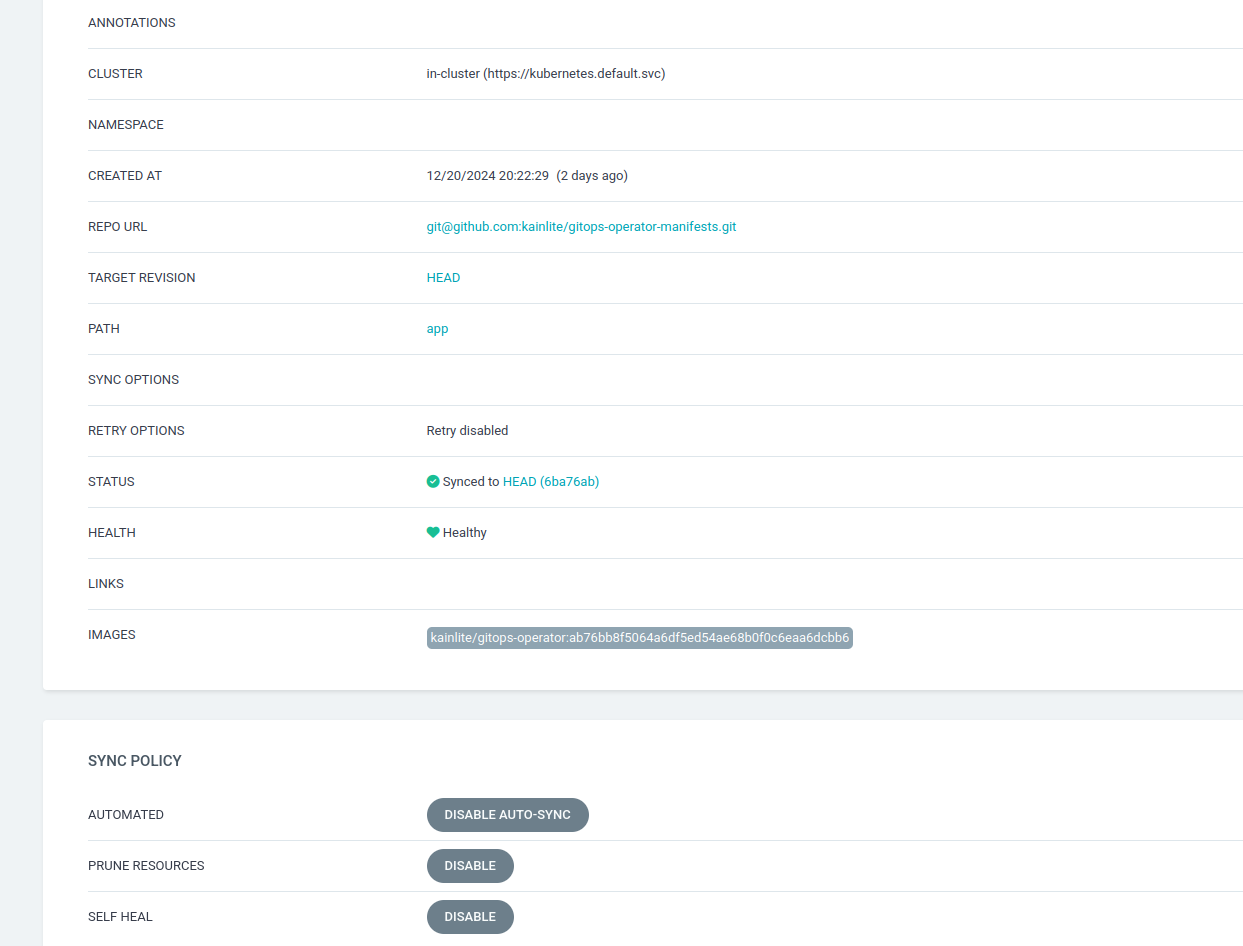
Everything should look something like this:
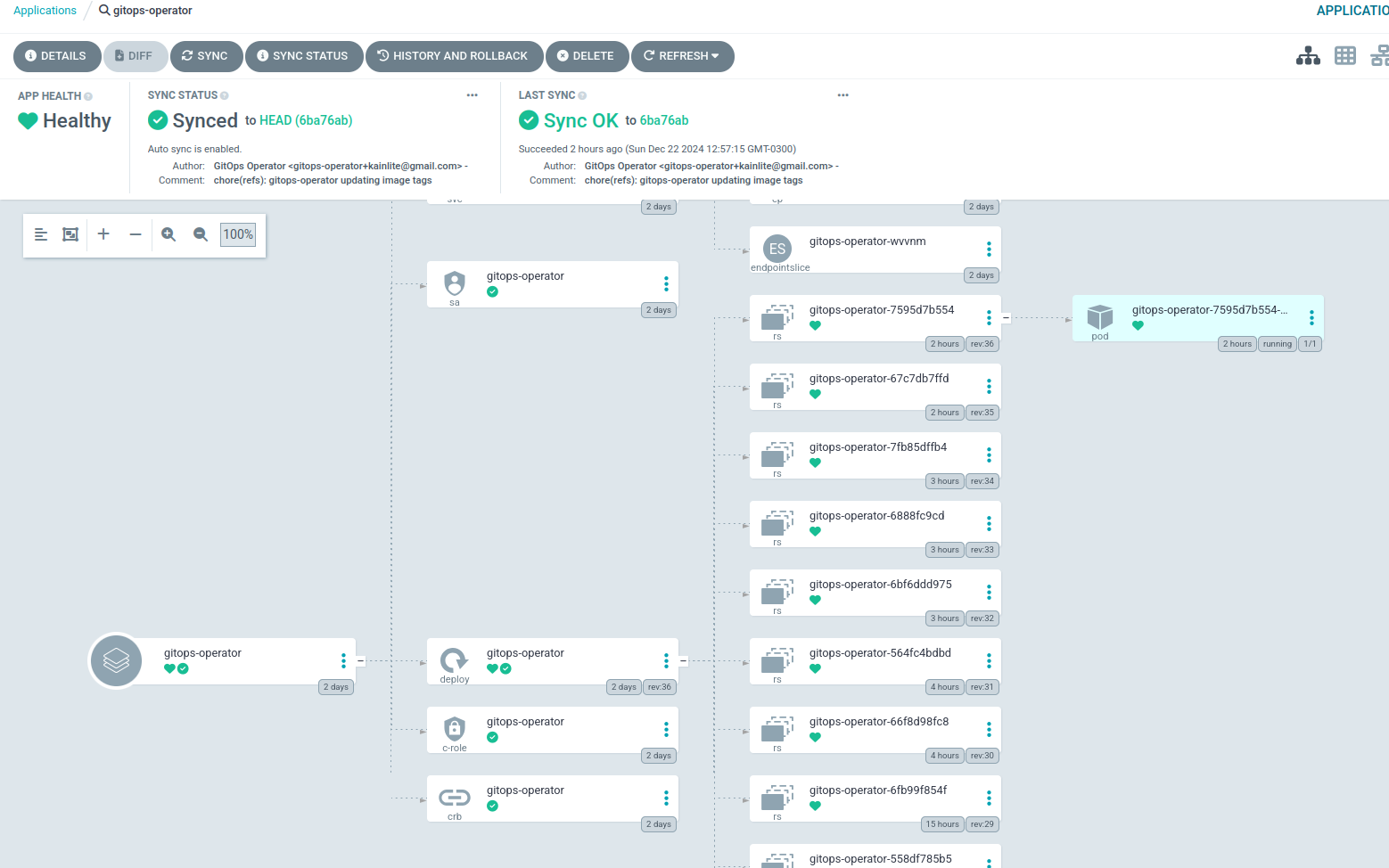
You can generate an RSA key like this:
ssh-keygen -t rsa -b 4096 -f ~/.ssh/id_rsa_demo
Then in the GitHub repository we need to allow that key (using the public key) to read and write to the manifests
repository (Settings->Deploy Key->Fill the contents and check the box to give it write permissions):
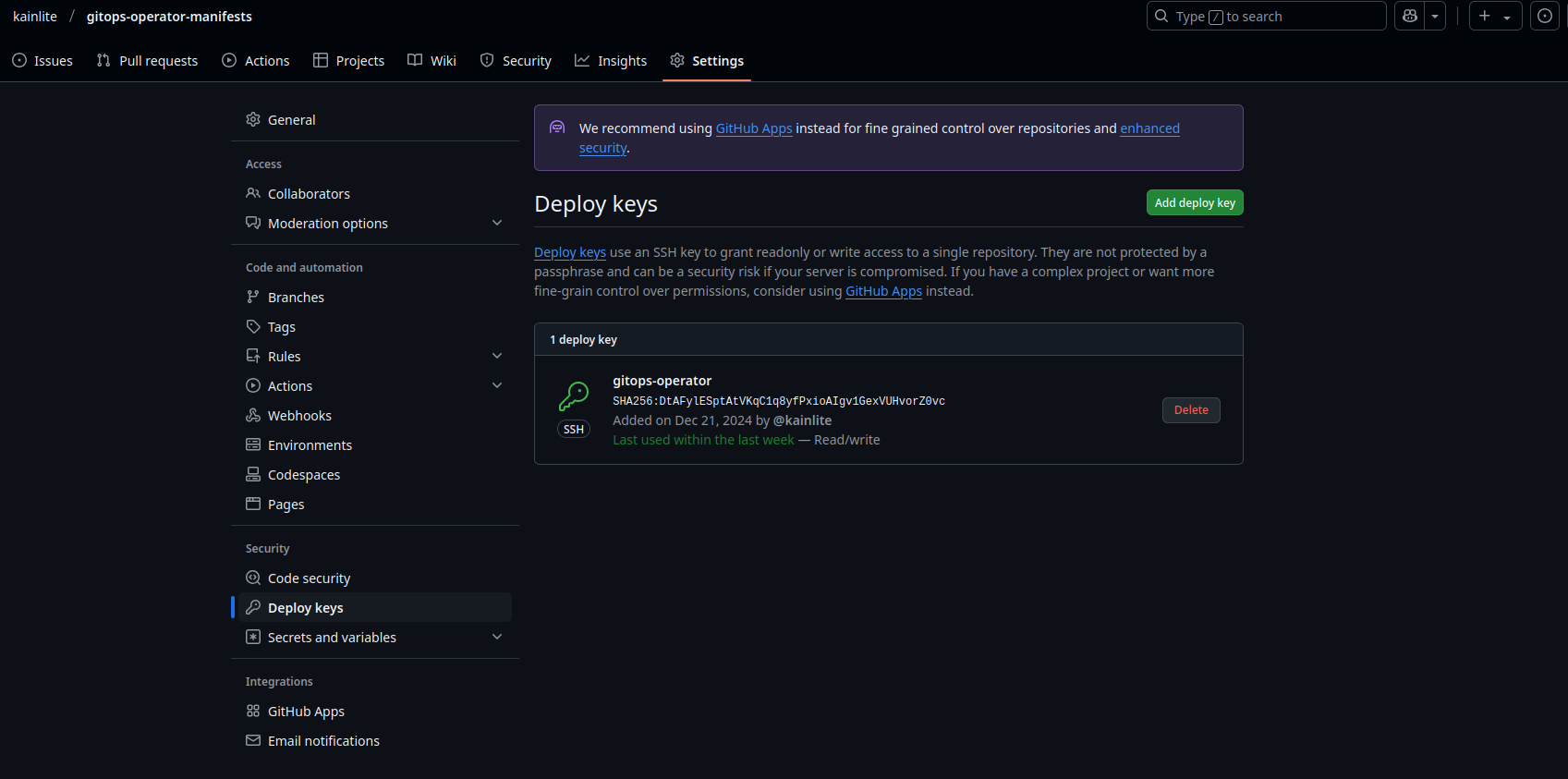
That was a lot of preparation, do note that we already have a CI configuration in place to build the images and push them to dockerhub, you might be thinking why not just stick to the push method and modify the deployment in place and just push the change to the cluster, well there are several differences but some of them are in most cases the CI pipeline doesn’t need access to the cluster (practical and security concern, yes you can run the CI pipeline from/in the cluster using Tekton for example), the other consideration is the flexibility that you can gain to manage your app lifecycle by just having a controller with your logic embedded and setting your own configuration to deploy it as it best suit your needs, think of it as a building block of your platform.
The code
While this is an MVP so far or a toy project, it does the minimum that it needs to do, but it might be fragile and many cases were not contemplated just for the sake of simplicity and because that’s usually what you need for your first software version of anything, it needs to work, then it can be refactored, improved, get more features, tests (or better tests), etc, etc, etc.
By the way, I’m just learning Rust so don’t expect a production grade code or the most efficient code, but somewhat something that works tm!
Dockerfile
The Dockerfile is pretty straight-forward, basically we build a production release and copy that and the known_hosts file to the home path of the user that will be running the image (this is necessary since we are using SSH authentication).
FROM clux/muslrust:stable AS builder
COPY Cargo.* .
COPY *.rs .
RUN --mount=type=cache,target=/volume/target \
--mount=type=cache,target=/root/.cargo/registry \
cargo build --release --bin gitops-operator && \
mv /volume/target/x86_64-unknown-linux-musl/release/gitops-operator .
FROM cgr.dev/chainguard/static
COPY --from=builder --chown=nonroot:nonroot /volume/gitops-operator /app/
COPY files/known_hosts /home/nonroot/.ssh/known_hosts
EXPOSE 8080
ENTRYPOINT ["/app/gitops-operator"]
Next up we can check the known_hosts file, these signatures were taken from here, but you can also do it with
ssh-keygen.
github.com ssh-ed25519 AAAAC3NzaC1lZDI1NTE5AAAAIOMqqnkVzrm0SdG6UOoqKLsabgH5C9okWi0dh2l9GKJl
github.com ecdsa-sha2-nistp256 AAAAE2VjZHNhLXNoYTItbmlzdHAyNTYAAAAIbmlzdHAyNTYAAABBBEmKSENjQEezOmxkZMy7opKgwFB9nkt5YRrYMjNuG5N87uRgg6CLrbo5wAdT/y6v0mKV0U2w0WZ2YB/++Tpockg=
github.com ssh-rsa AAAAB3NzaC1yc2EAAAADAQABAAABgQCj7ndNxQowgcQnjshcLrqPEiiphnt+VTTvDP6mHBL9j1aNUkY4Ue1gvwnGLVlOhGeYrnZaMgRK6+PKCUXaDbC7qtbW8gIkhL7aGCsOr/C56SJMy/BCZfxd1nWzAOxSDPgVsmerOBYfNqltV9/hWCqBywINIR+5dIg6JTJ72pcEpEjcYgXkE2YEFXV1JHnsKgbLWNlhScqb2UmyRkQyytRLtL+38TGxkxCflmO+5Z8CSSNY7GidjMIZ7Q4zMjA2n1nGrlTDkzwDCsw+wqFPGQA179cnfGWOWRVruj16z6XyvxvjJwbz0wQZ75XK5tKSb7FNyeIEs4TT4jk+S4dhPeAUC5y+bDYirYgM4GC7uEnztnZyaVWQ7B381AK4Qdrwt51ZqExKbQpTUNn+EjqoTwvqNj4kqx5QUCI0ThS/YkOxJCXmPUWZbhjpCg56i+2aB6CmK2JGhn57K5mj0MNdBXA4/WnwH6XoPWJzK5Nyu2zB3nAZp+S5hpQs+p1vN1/wsjk=The actual code
This file is the main.rs file cargo will look for (as I configured it to), to build our app and in short it will setup an
HTTP Web server on port 8000 with two routes (/health and /reconcile), instead of setting up a proper reconcile method
(usually a recursive function or using a callback) I decided to use the Readiness Probe to trigger a call to the
endpoint /reconcile and making it run every two minutes (we will check that when we get to the manifests).
pub mod files;
pub mod git;
use axum::extract::State;
use axum::{routing, Json, Router};
use futures::{future, StreamExt};
use k8s_openapi::api::apps::v1::Deployment;
use kube::runtime::{reflector, watcher, WatchStreamExt};
use kube::{Api, Client, ResourceExt};
use std::collections::BTreeMap;
use tracing::{debug, warn};
use files::patch_deployment_and_commit;
use git::clone_repo;
#[derive(serde::Serialize, Clone)]
struct Config {
enabled: bool,
namespace: String,
app_repository: String,
manifest_repository: String,
image_name: String,
deployment_path: String,
}
#[derive(serde::Serialize, Clone)]
struct Entry {
container: String,
name: String,
namespace: String,
annotations: BTreeMap<String, String>,
version: String,
config: Config,
}
type Cache = reflector::Store<Deployment>;
fn deployment_to_entry(d: &Deployment) -> Option<Entry> {
let name = d.name_any();
let namespace = d.namespace()?;
let annotations = d.metadata.annotations.as_ref()?;
let tpl = d.spec.as_ref()?.template.spec.as_ref()?;
let img = tpl.containers.get(0)?.image.as_ref()?;
let splits = img.splitn(2, ':').collect::<Vec<_>>();
let (container, version) = match *splits.as_slice() {
[c, v] => (c.to_owned(), v.to_owned()),
[c] => (c.to_owned(), "latest".to_owned()),
_ => return None,
};
let enabled = annotations.get("gitops.operator.enabled")?.trim().parse().unwrap();
let app_repository = annotations.get("gitops.operator.app_repository")?.to_string();
let manifest_repository = annotations.get("gitops.operator.manifest_repository")?.to_string();
let image_name = annotations.get("gitops.operator.image_name")?.to_string();
let deployment_path = annotations.get("gitops.operator.deployment_path")?.to_string();
println!("Processing: {}/{}", &namespace, &name);
Some(Entry {
name,
namespace: namespace.clone(),
annotations: annotations.clone(),
container,
version,
config: Config {
enabled,
namespace: namespace.clone(),
app_repository,
manifest_repository,
image_name,
deployment_path,
},
})
}
// - GET /reconcile
async fn reconcile(State(store): State<Cache>) -> Json<Vec<Entry>> {
let data: Vec<_> = store.state().iter().filter_map(|d| deployment_to_entry(d)).collect();
for entry in &data {
if !entry.config.enabled {
println!("continue");
continue;
}
// Perform reconciliation
let app_local_path = format!("/tmp/app-{}", &entry.name);
let manifest_local_path = format!("/tmp/manifest-{}", &entry.name);
clone_repo(&entry.config.app_repository, &app_local_path);
clone_repo(&entry.config.manifest_repository, &manifest_local_path);
let _ = patch_deployment_and_commit(
format!("/tmp/app-{}", &entry.name).as_ref(),
format!("/tmp/manifest-{}", &entry.name).as_ref(),
&entry.config.deployment_path,
&entry.config.image_name,
);
}
Json(data)
}
#[tokio::main]
async fn main() -> anyhow::Result<()> {
println!("Starting gitops-operator");
tracing_subscriber::fmt::init();
let client = Client::try_default().await?;
let api: Api<Deployment> = Api::all(client);
let (reader, writer) = reflector::store();
let watch = reflector(writer, watcher(api, Default::default()))
.default_backoff()
.touched_objects()
.for_each(|r| {
future::ready(match r {
Ok(o) => debug!("Saw {} in {}", o.name_any(), o.namespace().unwrap()),
Err(e) => warn!("watcher error: {e}"),
})
});
tokio::spawn(watch); // poll forever
let app = Router::new()
.route("/reconcile", routing::get(reconcile))
.with_state(reader) // routes can read from the reflector store
.layer(tower_http::trace::TraceLayer::new_for_http())
// NB: routes added after TraceLayer are not traced
.route("/health", routing::get(|| async { "up" }));
let listener = tokio::net::TcpListener::bind("0.0.0.0:8000").await?;
axum::serve(listener, app.into_make_service()).await?;
Ok(())
}
Then in this file files.rs we have some functions that deal with files and actually updating the deployment file.
use crate::git::stage_and_push_changes;
use anyhow::Context;
use anyhow::Error;
use git2::Error as GitError;
use git2::Repository;
use k8s_openapi::api::apps::v1::Deployment;
use serde_yaml;
use std::fs;
fn patch_image_tag(file_path: String, image_name: String, new_sha: String) -> Result<(), Error> {
println!("Patching image tag in deployment file: {}", file_path);
let yaml_content = fs::read_to_string(&file_path).context("Failed to read deployment YAML file")?;
println!("before: {:?}", yaml_content);
// Parse the YAML into a Deployment resource
let mut deployment: Deployment =
serde_yaml::from_str(&yaml_content).context("Failed to parse YAML into Kubernetes Deployment")?;
// Modify deployment specifics
if let Some(spec) = deployment.spec.as_mut() {
if let Some(template) = spec.template.spec.as_mut() {
for container in &mut template.containers {
if container.image.as_ref().unwrap().contains(&new_sha) {
println!("Image tag already updated... Aborting mission!");
return Err(anyhow::anyhow!("Image tag {} is already up to date", new_sha));
}
if container.image.as_ref().unwrap().contains(&image_name) {
container.image = Some(format!("{}:{}", &image_name, &new_sha));
}
}
}
}
// Optional: Write modified deployment back to YAML file
let updated_yaml =
serde_yaml::to_string(&deployment).context("Failed to serialize updated deployment")?;
println!("updated yaml: {:?}", updated_yaml);
fs::write(file_path, updated_yaml).context("Failed to write updated YAML back to file")?;
Ok(())
}
pub fn patch_deployment_and_commit(
app_repo_path: &str,
manifest_repo_path: &str,
file_name: &str,
image_name: &str,
) -> Result<(), GitError> {
println!("Patching deployment and committing changes");
let commit_message = "chore(refs): gitops-operator updating image tags";
let app_repo = Repository::open(&app_repo_path)?;
let manifest_repo = Repository::open(&manifest_repo_path)?;
// Find the latest remote head
// While this worked, it failed in some scenarios that were unimplemented
// let new_sha = app_repo.head()?.peel_to_commit().unwrap().parent(1)?.id().to_string();
let fetch_head = app_repo.find_reference("FETCH_HEAD")?;
let remote = app_repo.reference_to_annotated_commit(&fetch_head)?;
let remote_commit = app_repo.find_commit(remote.id())?;
let new_sha = remote_commit.id().to_string();
println!("New application SHA: {}", new_sha);
// Perform changes
let patch = patch_image_tag(
format!("{}/{}", manifest_repo_path, file_name),
image_name.to_string(),
new_sha,
);
match patch {
Ok(_) => println!("Image tag updated successfully"),
Err(e) => {
println!("We don't need to update image tag: {:?}", e);
return Err(GitError::from_str(
"Aborting update image tag, already updated...",
));
}
}
// Stage and push changes
let _ = stage_and_push_changes(&manifest_repo, commit_message)?;
Ok(())
}
And last but not least git.rs, possibly the complex part in this project, git… This file has a few functions to deal with
cloning, fetching and merging remote changes, then to add our local changes, stage them and push them to the repository:
use git2::{
build::RepoBuilder, CertificateCheckStatus, Cred, Error as GitError, FetchOptions, RemoteCallbacks,
Repository,
};
use std::env;
use std::io::{self, Write};
use std::path::{Path, PathBuf};
use git2::Signature;
use std::time::{SystemTime, UNIX_EPOCH};
fn create_signature<'a>() -> Result<Signature<'a>, GitError> {
let name = "GitOps Operator";
let email = "[email protected]";
// Get current timestamp
let time = SystemTime::now().duration_since(UNIX_EPOCH).unwrap().as_secs();
// Create signature with current timestamp
Signature::new(name, email, &git2::Time::new(time as i64, 0))
}
fn normal_merge(
repo: &Repository,
local: &git2::AnnotatedCommit,
remote: &git2::AnnotatedCommit,
) -> Result<(), git2::Error> {
let local_tree = repo.find_commit(local.id())?.tree()?;
let remote_tree = repo.find_commit(remote.id())?.tree()?;
let ancestor = repo.find_commit(repo.merge_base(local.id(), remote.id())?)?.tree()?;
let mut idx = repo.merge_trees(&ancestor, &local_tree, &remote_tree, None)?;
if idx.has_conflicts() {
println!("Merge conflicts detected...");
repo.checkout_index(Some(&mut idx), None)?;
return Ok(());
}
let result_tree = repo.find_tree(idx.write_tree_to(repo)?)?;
// now create the merge commit
let msg = format!("Merge: {} into {}", remote.id(), local.id());
let sig = repo.signature()?;
let local_commit = repo.find_commit(local.id())?;
let remote_commit = repo.find_commit(remote.id())?;
// Do our merge commit and set current branch head to that commit.
let _merge_commit = repo.commit(
Some("HEAD"),
&sig,
&sig,
&msg,
&result_tree,
&[&local_commit, &remote_commit],
)?;
// Set working tree to match head.
repo.checkout_head(None)?;
Ok(())
}
pub fn clone_or_update_repo(url: &str, repo_path: PathBuf) -> Result<(), GitError> {
println!("Cloning or updating repository from: {}", &url);
// Setup SSH key authentication
let mut callbacks = RemoteCallbacks::new();
callbacks.credentials(|_url, username_from_url, _allowed_types| {
// Dynamically find SSH key path
let ssh_key_path = format!(
"{}/.ssh/id_rsa_demo",
env::var("HOME").expect("HOME environment variable not set")
);
println!("Using SSH key: {}", &ssh_key_path);
println!("{}", Path::new(&ssh_key_path).exists());
Cred::ssh_key(
username_from_url.unwrap_or("git"),
None,
Path::new(&ssh_key_path),
None,
)
});
// TODO: implement certificate check, potentially insecure
callbacks.certificate_check(|_cert, _host| {
// Return true to indicate we accept the host
Ok(CertificateCheckStatus::CertificateOk)
});
// Prepare fetch options
let mut fetch_options = FetchOptions::new();
fetch_options.remote_callbacks(callbacks);
fetch_options.download_tags(git2::AutotagOption::All);
// Check if repository already exists
if repo_path.exists() {
println!("Repository already exists, pulling...");
// Open existing repository
let repo = Repository::open(&repo_path)?;
// Fetch changes
fetch_existing_repo(&repo, &mut fetch_options)?;
// Pull changes (merge)
pull_repo(&repo, &fetch_options)?;
} else {
println!("Repository does not exist, cloning...");
// Clone new repository
clone_new_repo(url, &repo_path, fetch_options)?;
}
Ok(())
}
/// Fetch changes for an existing repository
fn fetch_existing_repo(repo: &Repository, fetch_options: &mut FetchOptions) -> Result<(), GitError> {
println!("Fetching changes for existing repository");
// Find the origin remote
let mut remote = repo.find_remote("origin")?;
// Fetch all branches
let refs = &["refs/heads/master:refs/remotes/origin/master"];
remote.fetch(refs, Some(fetch_options), None)?;
Ok(())
}
/// Clone a new repository
fn clone_new_repo(url: &str, local_path: &Path, fetch_options: FetchOptions) -> Result<Repository, GitError> {
println!("Cloning repository from: {}", &url);
// Prepare repository builder
let mut repo_builder = RepoBuilder::new();
repo_builder.fetch_options(fetch_options);
// Clone the repository
repo_builder.clone(url, local_path)
}
/// Pull (merge) changes into the current branch
fn pull_repo(repo: &Repository, _fetch_options: &FetchOptions) -> Result<(), GitError> {
println!("Pulling changes into the current branch");
// Find remote branch
let remote_branch_name = format!("remotes/origin/master");
println!("Merging changes from remote branch: {}", &remote_branch_name);
// Annotated commit for merge
let fetch_head = repo.find_reference("FETCH_HEAD")?;
let fetch_commit = repo.reference_to_annotated_commit(&fetch_head)?;
// Perform merge analysis
let (merge_analysis, _) = repo.merge_analysis(&[&fetch_commit])?;
println!("Merge analysis result: {:?}", merge_analysis);
if merge_analysis.is_fast_forward() {
let refname = format!("refs/remotes/origin/master");
let mut reference = repo.find_reference(&refname)?;
reference.set_target(fetch_commit.id(), "Fast-Forward")?;
repo.set_head(&refname)?;
let _ = repo.checkout_head(Some(git2::build::CheckoutBuilder::default().force()));
Ok(())
} else if merge_analysis.is_normal() {
let head_commit = repo.reference_to_annotated_commit(&repo.head()?)?;
normal_merge(&repo, &head_commit, &fetch_commit)?;
Ok(())
} else if merge_analysis.is_up_to_date() {
println!("Repository is up to date");
Ok(())
} else {
Err(GitError::from_str("Unsupported merge analysis case"))
}
}
pub fn stage_and_push_changes(repo: &Repository, commit_message: &str) -> Result<(), GitError> {
println!("Staging and pushing changes");
// Stage all changes (equivalent to git add .)
let mut index = repo.index()?;
index.add_all(["*"].iter(), git2::IndexAddOption::DEFAULT, None)?;
index.write()?;
// Create a tree from the index
let tree_id = index.write_tree()?;
let tree = repo.find_tree(tree_id)?;
// Get the current head commit
let parent_commit = repo.head()?.peel_to_commit()?;
println!("Parent commit: {}", parent_commit.id());
// Prepare signature (author and committer)
// let signature = repo.signature()?;
let signature = create_signature()?;
println!("Author: {}", signature.name().unwrap());
// Create the commit
let commit_oid = repo.commit(
Some("HEAD"), // Update HEAD reference
&signature, // Author
&signature, // Committer
commit_message, // Commit message
&tree, // Tree to commit
&[&parent_commit], // Parent commit
)?;
println!("New commit: {}", commit_oid);
// Prepare push credentials
let mut callbacks = RemoteCallbacks::new();
callbacks.credentials(|_url, username_from_url, _allowed_types| {
// Dynamically find SSH key path
let ssh_key_path = format!(
"{}/.ssh/id_rsa_demo",
env::var("HOME").expect("HOME environment variable not set")
);
println!("Using SSH key: {}", &ssh_key_path);
println!("{}", Path::new(&ssh_key_path).exists());
Cred::ssh_key(
username_from_url.unwrap_or("git"),
None,
Path::new(&ssh_key_path),
None,
)
});
// TODO: implement certificate check, potentially insecure
callbacks.certificate_check(|_cert, _host| {
// Return true to indicate we accept the host
Ok(CertificateCheckStatus::CertificateOk)
});
// Print out our transfer progress.
callbacks.transfer_progress(|stats| {
if stats.received_objects() == stats.total_objects() {
print!(
"Resolving deltas {}/{}\r",
stats.indexed_deltas(),
stats.total_deltas()
);
} else if stats.total_objects() > 0 {
print!(
"Received {}/{} objects ({}) in {} bytes\r",
stats.received_objects(),
stats.total_objects(),
stats.indexed_objects(),
stats.received_bytes()
);
}
io::stdout().flush().unwrap();
true
});
// Prepare push options
let mut push_options = git2::PushOptions::new();
push_options.remote_callbacks(callbacks);
// Find the origin remote
let mut remote = repo.find_remote("origin")?;
println!("Pushing to remote: {}", remote.url().unwrap());
// Determine the current branch name
let branch_name = repo.head()?;
let refspec = format!("refs/heads/{}", branch_name.shorthand().unwrap_or("master"));
println!("Pushing to remote branch: {}", &refspec);
// Push changes
remote.push(&[&refspec], Some(&mut push_options))?;
Ok(())
}
// Example usage in the context of the original code
pub fn clone_repo(url: &str, local_path: &str) {
let repo_path = PathBuf::from(local_path);
match clone_or_update_repo(url, repo_path) {
Ok(_) => println!("Repository successfully updated"),
Err(e) => eprintln!("Error updating repository: {}", e),
}
}Some things that I need to improve in all that code is:
- Error handling
- Standardize all the functions so they behave in a similar fashion
- Standardize logging and remove all the debugging information
- Refactor the functions to be more specific and handle a single things
And a few more things, but remember this is an MVP all it matters so far is that it needs to work.
The pipeline
For the sake of completeness lets add the pipeline, as you can see we have two jobs and one to lint and check that the code is formatted and the other one to build and push the image to dockerhub, the most interesting bit is probably the cache dance.
name: ci
on:
pull_request:
push:
branches:
- master
tags:
- '*'
jobs:
docker:
runs-on: ubuntu-latest
permissions:
contents: read
packages: write
strategy:
fail-fast: false
matrix:
platform:
- linux/amd64
#- linux/arm64
steps:
- uses: actions/checkout@v4
- name: Set up QEMU
uses: docker/setup-qemu-action@v3
# Build and push with docker buildx
- name: Setup docker buildx
uses: docker/setup-buildx-action@v3
with:
config: .github/buildkitd.toml
- name: Configure tags based on git tags + latest
uses: docker/metadata-action@v5
id: meta
with:
images: ${{ github.repository }}
tags: |
type=sha,prefix=,suffix=,format=short
type=sha,prefix=,suffix=,format=long
type=ref,event=branch
type=pep440,pattern={{version}}
type=raw,value=latest,enable={{is_default_branch}}
type=ref,event=pr
- name: Rust Build Cache for Docker
uses: actions/cache@v4
with:
path: rust-build-cache
key: ${{ runner.os }}-build-cache-${{ hashFiles('**/Cargo.toml') }}
- name: inject rust-build-cache into docker
uses: overmindtech/buildkit-cache-dance/inject@main
with:
cache-source: rust-build-cache
- name: Docker login
uses: docker/login-action@v3
#if: github.event_name != 'pull_request'
with:
username: ${{ secrets.DOCKER_USERNAME }}
password: ${{ secrets.DOCKER_PASSWORD }}
- name: Docker build and push with cache
uses: docker/build-push-action@v6
with:
context: .
# when not using buildkit cache
#cache-from: type=registry,ref=ghcr.io/${{ github.repository }}:buildcache
#cache-to: type=registry,ref=ghcr.io/${{ github.repository }}:buildcache
# when using buildkit-cache-dance
cache-from: type=gha
cache-to: type=gha,mode=max
#push: ${{ github.ref == 'refs/heads/main' }}
push: true
tags: ${{ steps.meta.outputs.tags }}
platforms: ${{ matrix.platform }}
- name: extract rust-build-cache from docker
uses: overmindtech/buildkit-cache-dance/extract@main
with:
cache-source: rust-build-cache
lint:
runs-on: ubuntu-latest
steps:
- uses: actions/checkout@v4
- uses: dtolnay/rust-toolchain@stable
with:
toolchain: stable
components: rustfmt,clippy
- run: cargo fmt -- --check
- uses: giraffate/clippy-action@v1
with:
reporter: 'github-pr-review'
github_token: ${{ secrets.GITHUB_TOKEN }}
So whenever we make a change to the application we will automatically see a commit from the controller like this:
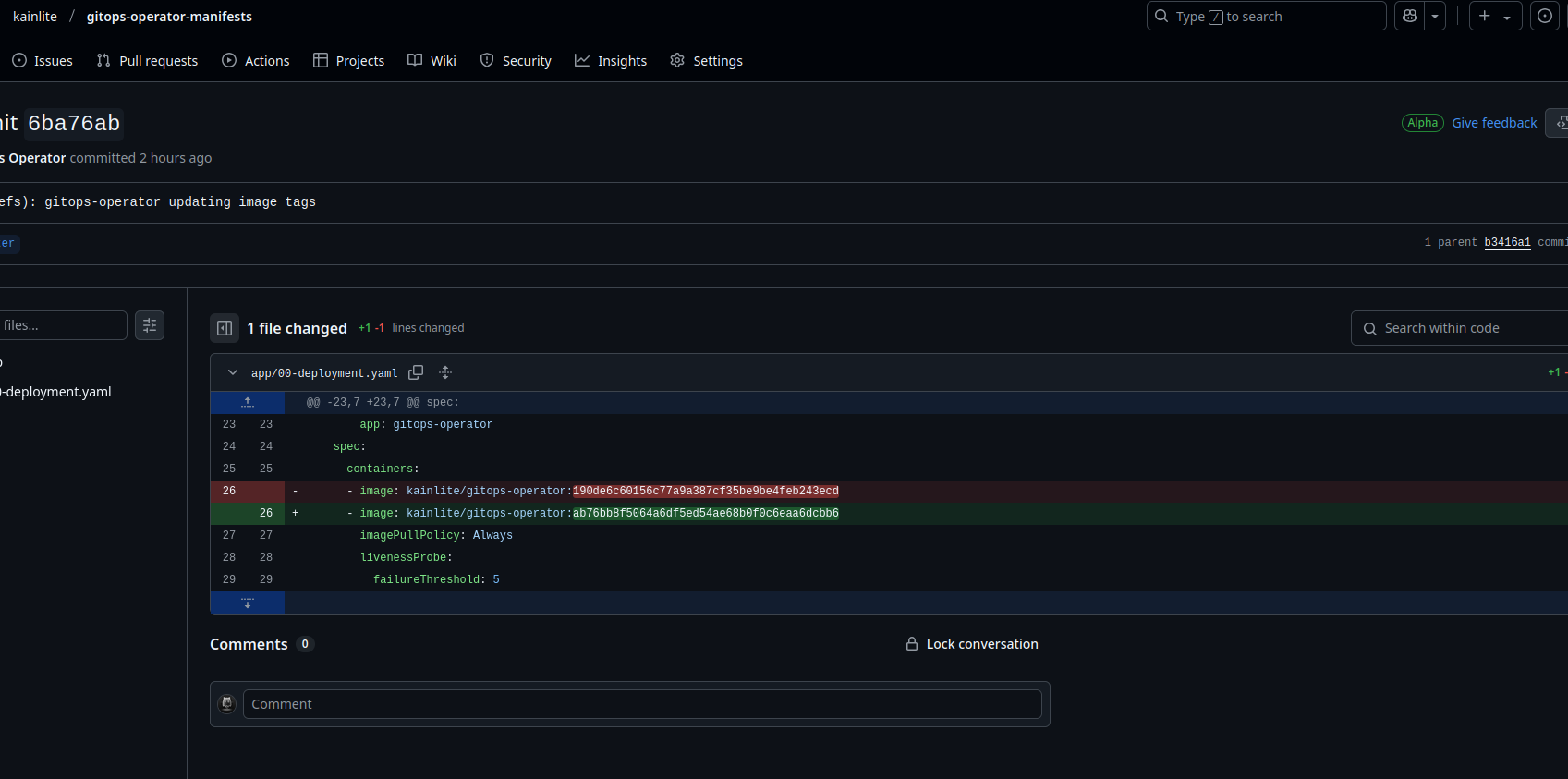
Manifests
One of the things that we need to do for this to work is to store our SSH key as a secret so we can mount it (we could have read the secret from the controller using kube-rs, but this was simpler), as you will notice we have a set of annotations to configure the controller to act on our deployment, and then we mount the ssh key that we generated before so it can actually fetch and write to the manifests repository.
Also you will notice that we are calling the /reconcile path every two minutes from the Readiness Probe, as Kubernetes
will keep calling that endpoint every two minutes to it based in our configuration and since we are not expecting any
external traffic this should do, it should be also relatively safe to run it concurrently so this is good enough for
now.
apiVersion: apps/v1
kind: Deployment
metadata:
annotations:
gitops.operator.app_repository: git@github.com:kainlite/gitops-operator.git
gitops.operator.deployment_path: app/00-deployment.yaml
gitops.operator.enabled: 'true'
gitops.operator.image_name: kainlite/gitops-operator
gitops.operator.manifest_repository: git@github.com:kainlite/gitops-operator-manifests.git
gitops.operator.namespace: default
labels:
app: gitops-operator
name: gitops-operator
namespace: default
spec:
replicas: 1
selector:
matchLabels:
app: gitops-operator
template:
metadata:
labels:
app: gitops-operator
spec:
containers:
- image: kainlite/gitops-operator:ab76bb8f5064a6df5ed54ae68b0f0c6eaa6dcbb6
imagePullPolicy: Always
livenessProbe:
failureThreshold: 5
httpGet:
path: /health
port: http
periodSeconds: 15
name: gitops-operator
ports:
- containerPort: 8000
name: http
protocol: TCP
readinessProbe:
httpGet:
path: /reconcile
port: http
initialDelaySeconds: 60
periodSeconds: 120
timeoutSeconds: 60
resources:
limits:
cpu: 1000m
memory: 1024Mi
requests:
cpu: 500m
memory: 100Mi
volumeMounts:
- mountPath: /home/nonroot/.ssh/id_rsa_demo
name: my-ssh-key
readOnly: true
subPath: ssh-privatekey
serviceAccountName: gitops-operator
volumes:
- name: my-ssh-key
secret:
items:
- key: ssh-privatekey
path: ssh-privatekey
secretName: my-ssh-keyBONUS! If you don’t recall how to create a key and store it as a secret it is really simple, if you need help or want a quick reference of the most used ways to create and use secrets in Kubernetes check my article about it:
ssh-keygen -t rsa -b 4096 -f ~/.ssh/id_rsa_demo
kubectl create secret generic my-ssh-key --from-file=ssh-privatekey=~/.ssh/id_rsa_demoAnd that’s it! I will be adding a video version soon, follow me on LinkedIn to stay up to date! See you next time! 🚀
Closing notes
This was heavily inspired and based in the kube-rs: version-rs examples as well as many of the examples in the git2
repository, if you liked it follow me and share for more!
-
Comments
Online: 0
Please sign in to be able to write comments.